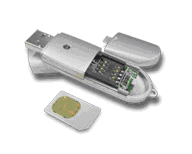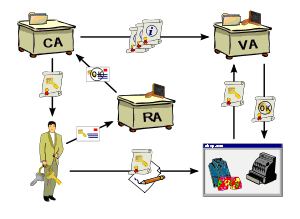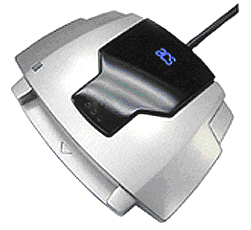- Home »
- Digital Signature Certificate »
- What is DSC
What is DSC
WHAT IS Electronic signature
Electronic signature is a tool that allows a person involved in electronic transaction to prove its identity to other participants in this transaction.
Qualified electronic signature is legally recognized as a handwritten signature to all persons in the country. This means that each document you sign it, has the same force and validity as if they sign a paper.
You can use Electronic signature
With qualified certificate you can perform the following activities:
- to sign documents;
- to use E-services, including those of the National Revenue Agency, Customs and other;
- to encrypt electronic transactions, including sending e-mail messages, so you can be sure that exchanged information can be read only by the addressee of a message;
- if you have a server that offers some services to ensure the identity on the web and to ensure that information exchanged with the server could not be read (decoded) by anyone apart from the identified server and its administrators;
- to sign a software object, proving the authorship on it, and others;
Hardware for Electronic signature certificate
To use the Electronic signature you need:
- Smart card,which record the electronic signature certificate (certificate),and


- Card reader
|
|
 |
Electronic signature certificate ensures:
- Authenticity - you know who you correspond;
- Integrity - the document has not been changed on the way to you via the Internet;
- Confidentiality - you can send confidential information known only to the communicating parties;
- Non-repudiation - your correspondent is the author and can not be denied their statement;
- Saving time - spent on the activity is drastically reduced; results in lower costs.
Electronic signature certificate - Technological definition
Electronic signature certificate, called a digital certificate represents formatted data that link a particular subscriber (natural or legal person in charge) with its public key stored on a smart card.
More for Electronic signature and Public Key Infrastructure (PKI) in technical and legal terms
Digital signature props is an electronic document, designed to protect it from tampering. This is a cryptographic signature or, more accurately, a mathematical function resulting from the cryptographic processing, carried out in order to verify the sender's identity and to ensure that the information has not changed the path between sender and receiver. Electronic signatures are used in the distribution of software in financial transactions and anywhere important information is exchanged electronically, and is very important any falsification or tampering can be detected in time.
The digital signature algorithm used for encryption , a notch safer than algorithms using hash function to authenticate the sender. Used asymmetric cryptography key pair - private and public, thus one is encrypted and decrypted with the other.
According to the Bulgarian Law on Electronic Document and Electronic Signature universal electronic signature has the handwritten signature to all.
Author of the electronic statement is individual , in the statement as its performer. Holder of the e-statement is the person on whose behalf the electronic statement is made.
The certificate is a digital certificate , issued and signed by the certification services that include:
- name, address, personal identification number or unique identifier of the certification services as well as an indication of his nationality;
- name or business name, address, registration data of the holder of the Qualified electronic certificate;
- basis of authorization, the name and address of the individual (s) who is authorized to make electronic statements on behalf of the holder of the Qualified electronic certificate;
- public key corresponding to the private key holder Qualified electronic certificate;
- identifiers of the algorithms by which the public keys of the holder of Qualified electronic certificate and the provider of certification services;
- date and time of issuance, suspension, renewal and termination of the action;
- the duration;
- restrictions of the signature;
- the unique identification code of the certificate;
- liability and guarantees of the certification services;
- reference to the electronic signature certificate of the certification services as well as the registration of provider Regulatory Commission of Reports
Certification Service Provider is a person who:
1. certificates issued by Bulgarian Law on Electronic Document and Electronic Signature universal electronic signature and keep a register of them;
2. provide any third party access to the published certificates.
The certification services provider can provide services for creation of private and public keys for Qualified electronic certificate.
Regulatory authority in Bulgaria in the field of electronic signature is Regulatory Commission of Reports , which supervises the certification service providers the reliability and security of the certification services and maintain a register of public keys.
PKI Public Key Infrastructure - of Bulgarian occurs as "Public Key Infrastructure & quot ;," PKI & quot ;, "public key authentication & quot; - Is a technology to verify the authenticity of an electronic document using the public key. This is a combination of hardware, software, people, policies and procedures necessary for the issuance, management, distribution, use, storage and revocation of digital certificates.
In Cryptography PKI is the agreement that binds a public key with an identity of its owner (holder) by a certifying authority (in English: Certificate Authority or CA). The uniqueness of the connection is guaranteed by the CA by strictly formal process of registration and issuance of digital certificates (policies providing certification services), which can be done by both the software and the person. The authority that provides this unique connectivity is called registration authority (in English: Registration Authority or RA) and is a unit of CA (this may be authorized external organization) active acceptance, verification, approval or rejection of requests for certification. Another participant in the PKI is the verification body (in English: Vertification Authority or VA). At issued by the CA certificate with a public key encrypted number of attributes such as identity of the holder, the very public key, their relationship, the conditions of validity and others. in a way that ensures they can not be forged.

To put it more accessible language, RKI is used to check the participants in the transaction - whether it is one for which it is presented. This is particularly important as the Internet, as there no standard mechanism to verify the identity of the participants. By using PKI is possible to introduce concept of non-repudiation (recognition) of Internet-based transactions.
Stampit Skype
0700 14 220 - 7x24 hours
0 Т
0 Т

